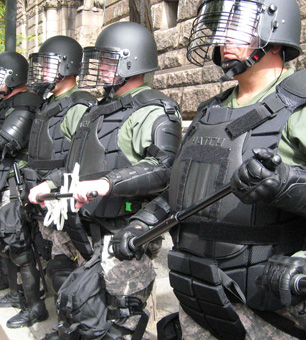“Has the United States become a police state?”
That’s the stark question I was asked at the beginning of a recent radio interview.
Framing the current political climate in these terms is quite blunt, and can be jarring to some people because it automatically conjures images of, for example, Nazi Germany. That’s clearly different than what is occurring right now in the United States. So how do we conceptualize the current state of government repression, and how do we put it in a historical context?
Is this a police state? If not, what is it?
The image that most people hold of a “police state” is a representation of extreme power dynamics, and repressive tactics to maintain them, at specific points of history. The current political climate in the United States is unique in many ways, and distinct from those eras. However, it shares core attributes that we generally associate with a “police state”:
1. Raids, Harassment, and Intimidation of Dissidents by Police
When FBI and Joint Terrorism Task Force agents raided multiple activist homes in the Northwest recently, they were in search of “anti-government or anarchist literature.”
2. Militarization of Domestic Law Enforcement
As Arthur Rizer wrote for The Atlantic:
In an effort to remedy their relative inadequacy in dealing with terrorism on U.S. soil, police forces throughout the country have purchased military equipment, adopted military training, and sought to inculcate a “soldier’s mentality” among their ranks.
3. Disproportionate Prison Sentences for Political Activists
The reason Marie Mason, who destroyed property, received a prison sentence twice as long as racists, who harmed human beings, is because of her politics.
Likewise Tim DeChristopher was sentenced to two years in prison for non-violent disrupting an illegal oil and gas lease auction because he cost corporations thousands of dollars.
4. Creation of New Laws for People Because of Their Political Beliefs
The Animal Enterprise Terrorism Act was created solely to prosecute activists who threaten the “loss of profits” for corporations.
And now 10 states have considered “Ag Gag” bills that go so far as to criminalize non-violent undercover investigations. The new bills have passed in two states, Utah and Iowa.
5. Creation of Special Prison Units
In addition to Guantanamo Bay, which Obama has refused to close, there are now two experimental prison units on U.S. soil for “domestic terrorists.” These Communications Management Units are for political prisoners that the U.S. Bureau of Prisons describes as having “inspirational significance.”
6. Pervasive Use of Surveillance
Spy drones are being used by domestic law enforcement for surveillance, artificial intelligence, and monitoring social movements (here’s a great overview from Salon).
Recently, Tampa police wanted to use them against RNC protesters.
This is in addition to widespread surveillance measures such as TrapWire.
7. Criminalization of Ideology
In my opinion this is the hallmark of any police state: the targets of the state have little to do with criminal activity, and everything to do with their perceived subversive ideology.
For example, consider these FBI “domestic terrorism” training documents which say that anarchists are “criminals seeking an ideology to justify their activities.”
There Is No “Tipping Point”
A final, more nebulous characteristic of a police state is the extent to which all of the tactics above take place. It’s a question of degree and intensity, and some would argue that, even though these tactics are occurring with increasing frequency, they are not at the level that would merit this kind of “police state” language. I think that’s completely reasonable.
But no matter how you feel about the characterization of what is occurring right now, the most important point is this: if we’re not a police state already, we are marching closer and closer every day.
In the following interview, I try to dispel some of the myths about police states and how they are created, including the flawed idea of a “tipping point” leading up to extreme states of repression.
Listen to the full interview here (starting at 55:43) or download it from iTunes (it’s the 8/23/12 show)
Our most important fundraising appeal of the year
December is the most critical time of year for Truthout, because our nonprofit news is funded almost entirely by individual donations from readers like you. So before you navigate away, we ask that you take just a second to support Truthout with a tax-deductible donation.
This year is a little different. We are up against a far-reaching, wide-scale attack on press freedom coming from the Trump administration. 2025 was a year of frightening censorship, news industry corporate consolidation, and worsening financial conditions for progressive nonprofits across the board.
We can only resist Trump’s agenda by cultivating a strong base of support. The right-wing mediasphere is funded comfortably by billionaire owners and venture capitalist philanthropists. At Truthout, we have you.
We’ve set an ambitious target for our year-end campaign — a goal of $112,000 to keep up our fight against authoritarianism in 2026. Please take a meaningful action in this fight: make a one-time or monthly donation to Truthout before December 31. If you have the means, please dig deep.
